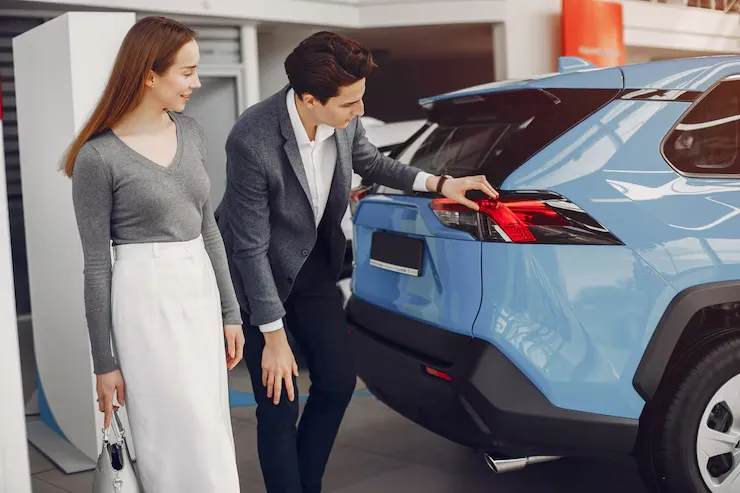The worldwide electric vehicle market is undergoing fast development, with Tesla and BYD leading the way. In 2025, rivalry between these manufacturers is fiercer than ever, reflecting changes in customer tastes, technology, and regional dynamics. This blog dives into the BYD vs Tesla battle, comparing market performance, pricing, quality, and features while also providing an overview of the growing EV market size and prognosis.]

According to recent data from JATO Dynamics, BYD vs Tesla saw a pivotal moment as BYD outsold Tesla in Europe for the first time in April 2025, registering 7,231 battery electric vehicles (BEVs) against Tesla’s 7,165 units. This milestone demonstrates BYD's aggressive expansion outside of its traditional strongholds, as well as its expanding prominence in the global electric vehicle market. The fight between BYD and Tesla has now spread beyond regional borders.
Globally, BYD and Tesla car sales represent two very distinct strategies. BYD's sales have skyrocketed due to its diverse portfolio, which comprises both BEVs and plug-in hybrid electric vehicles (PHEVs). Its manufacturing presence also includes rising markets like Thailand and Brazil, which helps to drive worldwide sales growth. Tesla, on the other hand, continues to lead in the United States, with sales exceeding 128,000 units in Q1 2025 alone, highlighting the company's enduring success in its home market.
Pricing is a major battleground in the BYD vs Tesla price war. BYD offers itself as an economical alternative, with models such as the BYD Seal and Dolphin ranging in price from $20,000 to $35,000, depending on the version and market. This pricing strategy allows BYD to attract cost-conscious customers looking for high-quality EVs at a reasonable price.
Tesla's Model 3 and Model Y, while praised for their innovation and performance, cost more, ranging from $38,990 to well than $50,000. The pricing difference between BYD vs Tesla reflects their different market tactics, with Tesla focusing on premium buyers and BYD seeking for greater accessibility.
When comparing BYD vs Tesla quality, both manufacturers produce automobiles of excellent build quality, but their priorities differ dramatically. Tesla prioritizes advanced software features such as its industry-leading Full Self-Driving (FSD) system, over-the-air updates, and a sleek interior design powered by cutting-edge infotainment systems.
BYD, meanwhile, focuses on robust hardware integration. Its proprietary DiPilot driver assistance system offers comprehensive safety features, and BYD uses custom-designed chips for optimized vehicle performance. Additionally, BYD’s batteries and thermal management systems are highly regarded, contributing to their vehicles’ reliability.
The BYD vs Tesla feature comparison also highlights differences in charging infrastructure. Tesla’s extensive Supercharger network provides a seamless charging experience worldwide, a significant competitive edge. BYD is rapidly expanding its charging capabilities, offering fast charging and home charger solutions, though its network is not as widespread yet.
In the critical U.S. market, the BYD vs Tesla sale in USA battle now benefits Tesla, which controls a commanding market share due to its strong brand recognition, large charging infrastructure, and established customer loyalty.
BYD is still in the early phases of entering the U.S. market. It intends to introduce new models geared to American consumers and is looking into collaborations to develop a larger local presence. Despite these efforts, the sales difference between BYD vs Tesla sale in USA remains large, demonstrating Tesla's established dominance.
The whole EV market is expected to grow rapidly in the next years. Acumen research and consulting believes the global EV market is worth USD 560.9 billion in 2023, with a compound annual growth rate (CAGR) of 17.6% predicted through 2032. This strong rise is being driven by technology improvements, falling battery costs, more government incentives, and growing consumer awareness of sustainable mobility.
EV market analysis suggests that Asia-Pacific leads in EV adoption, with BYD in China accounting for a sizable portion of global EV sales. Europe is quickly following suit, aided by stricter emission standards and increased investment in charging infrastructure. The U.S. market is important to Tesla's innovation leadership.
The Tesla vs BYD rivalry captures the changing dynamics of the worldwide EV industry in 2025. BYD's increasing sales and competitive pricing are altering the market, notably in Europe and emerging markets. Tesla's technological advantage and commercial dominance in the United States continue to help it preserve its dominant position.
As the EV market expands in size and complexity, understanding the strengths and strategies of these two companies is essential for industry observers and consumers alike. Their competition is not just about sales figures it drives innovation, shapes market trends, and accelerates the transition to sustainable transportation worldwide.